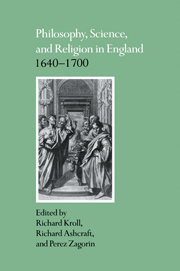Book contents
- Frontmatter
- Contents
- Notes on contributors
- Preface
- 1 Introduction
- Part I The Cambridge Platonists: philosophy at mid century
- 2 Henry More, the Kabbalah, and the Quakers
- 3 Edward Stillingfleet, Henry More, and the decline of Moses Atticus: a note on seventeenth-century Anglican apologetics
- 4 Latitudinarians, neoplatonists, and the ancient wisdom
- 5 Cudworth, More and the mechanical analogy
- 6 Cudworth and Hobbes on Is and Ought
- Part II The Restoration settlement
- Index
2 - Henry More, the Kabbalah, and the Quakers
Published online by Cambridge University Press: 05 November 2011
- Frontmatter
- Contents
- Notes on contributors
- Preface
- 1 Introduction
- Part I The Cambridge Platonists: philosophy at mid century
- 2 Henry More, the Kabbalah, and the Quakers
- 3 Edward Stillingfleet, Henry More, and the decline of Moses Atticus: a note on seventeenth-century Anglican apologetics
- 4 Latitudinarians, neoplatonists, and the ancient wisdom
- 5 Cudworth, More and the mechanical analogy
- 6 Cudworth and Hobbes on Is and Ought
- Part II The Restoration settlement
- Index
Summary
A discussion of Henry More's understanding of the Kabbalah and Quakerism must begin with some indication of how More came to be involved with either; and that leads to More's meeting with the enigmatic Dutchman, Francis Mercury van Helmont, in October 1670. Through his subsequent friendship with van Helmont, More's previous, though cursory, interest in both the Quakers and the Kabbalah became deeper and more personal. But before discussing the substance of this friendship, its improbable nature is worth a moment's consideration.
How could Henry More, that implacable enemy of enthusiasm and sectarianism, have developed such close personal and intellectual ties with a man whose life and thought seem so profoundly inimical to everything that More stood for? Van Helmont, whose quixotic, paradoxical spirit was attested by everyone, was an archetypal enthusiast. Born a Catholic, he had, in the years before his meeting with More, frequented many of the sects tacitly tolerated in Amsterdam, although persecuted elsewhere – the Mennonites, Collegiants, Seekers, Labadists, and Quakers. Van Helmont's quest for spiritual enlightenment ignored more than denominational boundaries, it transcended the limits of Christianity itself and took as its province all theology: ancient and modern, orthodox and heretical, Christian and non-Christian. Within this mix, the single most important and consistent influence on van Helmont's thought was the Lurianic Kabbalah. His commitment to the Kabbalah was responsible for his arrest and imprisonment by the Roman Inquisition in 1661 on the charge of “judaizing.” But neither his imprisonment nor the intervening years had dampened van Helmont's enthusiasm for the Kabbalah. When he arrived to dine with More in his chambers at Christ's College, the Kabbalistic doctrine of reincarnation was the main topic of conversation.
- Type
- Chapter
- Information
- Philosophy, Science, and Religion in England 1640–1700 , pp. 31 - 67Publisher: Cambridge University PressPrint publication year: 1992
- 11
- Cited by



